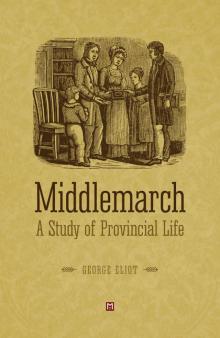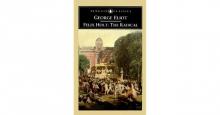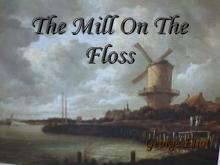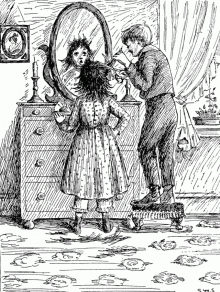- Home
- George Eliot
Silas Marner Page 2
Silas Marner Read online
Page 2
And what could be more unlike that Lantern Yard world than the world in Raveloe?--orchards looking lazy with neglected plenty; the large church in the wide churchyard, which men gazed at lounging at their own doors in service-time; the purple-faced farmers jogging along the lanes or turning in at the Rainbow; homesteads, where men supped heavily and slept in the light of the evening hearth, and where women seemed to be laying up a stock of linen for the life to come. There were no lips in Raveloe from which a word could fall that would stir Silas Marner's benumbed faith to a sense of pain. In the early ages of the world, we know, it was believed that each territory was inhabited and ruled by its own divinities, so that a man could cross the bordering heights and be out of the reach of his native gods, whose presence was confined to the streams and the groves and the hills among which he had lived from his birth. And poor Silas was vaguely conscious of something not unlike the feeling of primitive men, when they fled thus, in fear or in sullenness, from the face of an unpropitious deity. It seemed to him that the Power he had vainly trusted in among the streets and at the prayer-meetings, was very far away from this land in which he had taken refuge, where men lived in careless abundance, knowing and needing nothing of that trust, which, for him, had been turned to bitterness. The little light he possessed spread its beams so narrowly, that frustrated belief was a curtain broad enough to create for him the blackness of night.
His first movement after the shock had been to work in his loom; and he went on with this unremittingly, never asking himself why, now he was come to Raveloe, he worked far on into the night to finish the tale of Mrs. Osgood's table-linen sooner than she expected-- without contemplating beforehand the money she would put into his hand for the work. He seemed to weave, like the spider, from pure impulse, without reflection. Every man's work, pursued steadily, tends in this way to become an end in itself, and so to bridge over the loveless chasms of his life. Silas's hand satisfied itself with throwing the shuttle, and his eye with seeing the little squares in the cloth complete themselves under his effort. Then there were the calls of hunger; and Silas, in his solitude, had to provide his own breakfast, dinner, and supper, to fetch his own water from the well, and put his own kettle on the fire; and all these immediate promptings helped, along with the weaving, to reduce his life to the unquestioning activity of a spinning insect. He hated the thought of the past; there was nothing that called out his love and fellowship toward the strangers he had come amongst; and the future was all dark, for there was no Unseen Love that cared for him. Thought was arrested by utter bewilderment, now its old narrow pathway was closed, and affection seemed to have died under the bruise that had fallen on its keenest nerves.
But at last Mrs. Osgood's table-linen was finished, and Silas was paid in gold. His earnings in his native town, where he worked for a wholesale dealer, had been after a lower rate; he had been paid weekly, and of his weekly earnings a large proportion had gone to objects of piety and charity. Now, for the first time in his life, he had five bright guineas put into his hand; no man expected a share of them, and he loved no man that he should offer him a share. But what were the guineas to him who saw no vista beyond countless days of weaving? It was needless for him to ask that, for it was pleasant to him to feel them in his palm, and look at their bright faces, which were all his own: it was another element of life, like the weaving and the satisfaction of hunger, subsisting quite aloof from the life of belief and love from which he had been cut off. The weaver's hand had known the touch of hard-won money even before the palm had grown to its full breadth; for twenty years, mysterious money had stood to him as the symbol of earthly good, and the immediate object of toil. He had seemed to love it little in the years when every penny had its purpose for him; for he loved the purpose then. But now, when all purpose was gone, that habit of looking towards the money and grasping it with a sense of fulfilled effort made a loam that was deep enough for the seeds of desire; and as Silas walked homeward across the fields in the twilight, he drew out the money and thought it was brighter in the gathering gloom.
About this time an incident happened which seemed to open a possibility of some fellowship with his neighbours. One day, taking a pair of shoes to be mended, he saw the cobbler's wife seated by the fire, suffering from the terrible symptoms of heart-disease and dropsy, which he had witnessed as the precursors of his mother's death. He felt a rush of pity at the mingled sight and remembrance, and, recalling the relief his mother had found from a simple preparation of foxglove, he promised Sally Oates to bring her something that would ease her, since the doctor did her no good. In this office of charity, Silas felt, for the first time since he had come to Raveloe, a sense of unity between his past and present life, which might have been the beginning of his rescue from the insect-like existence into which his nature had shrunk. But Sally Oates's disease had raised her into a personage of much interest and importance among the neighbours, and the fact of her having found relief from drinking Silas Marner's
"stuff" became a matter of general discourse. When Doctor Kimble gave physic, it was natural that it should have an effect; but when a weaver, who came from nobody knew where, worked wonders with a bottle of brown waters, the occult character of the process was evident. Such a sort of thing had not been known since the Wise Woman at Tarley died; and she had charms as well as "stuff": everybody went to her when their children had fits. Silas Marner must be a person of the same sort, for how did he know what would bring back Sally Oates's breath, if he didn't know a fine sight more than that? The Wise Woman had words that she muttered to herself, so that you couldn't hear what they were, and if she tied a bit of red thread round the child's toe the while, it would keep off the water in the head. There were women in Raveloe, at that present time, who had worn one of the Wise Woman's little bags round their necks, and, in consequence, had never had an idiot child, as Ann Coulter had. Silas Marner could very likely do as much, and more; and now it was all clear how he should have come from unknown parts, and be so "comical-looking". But Sally Oates must mind and not tell the doctor, for he would be sure to set his face against Marner: he was always angry about the Wise Woman, and used to threaten those who went to her that they should have none of his help any more.
Silas now found himself and his cottage suddenly beset by mothers who wanted him to charm away the whooping-cough, or bring back the milk, and by men who wanted stuff against the rheumatics or the knots in the hands; and, to secure themselves against a refusal, the applicants brought silver in their palms. Silas might have driven a profitable trade in charms as well as in his small list of drugs; but money on this condition was no temptation to him: he had never known an impulse towards falsity, and he drove one after another away with growing irritation, for the news of him as a wise man had spread even to Tarley, and it was long before people ceased to take long walks for the sake of asking his aid.
But the hope in his wisdom was at length changed into dread, for no one believed him when he said he knew no charms and could work no cures, and every man and woman who had an accident or a new attack after applying to him, set the misfortune down to Master Marner's ill-will and irritated glances.
Thus it came to pass that his movement of pity towards Sally Oates, which had given him a transient sense of brotherhood, heightened the repulsion between him and his neighbours, and made his isolation more complete.
Gradually the guineas, the crowns, and the half-crowns grew to a heap, and Marner drew less and less for his own wants, trying to solve the problem of keeping himself strong enough to work sixteen hours a-day on as small an outlay as possible. Have not men, shut up in solitary imprisonment, found an interest in marking the moments by straight strokes of a certain length on the wall, until the growth of the sum of straight strokes, arranged in triangles, has become a mastering purpose? Do we not wile away moments of inanity or fatigued waiting by repeating some trivial movement or sound, until the repetition has bred a want, which is incipient habit? That will help us to understan
d how the love of accumulating money grows an absorbing passion in men whose imaginations, even in the very beginning of their hoard, showed them no purpose beyond it.
Marner wanted the heaps of ten to grow into a square, and then into a larger square; and every added guinea, while it was itself a satisfaction, bred a new desire. In this strange world, made a hopeless riddle to him, he might, if he had had a less intense nature, have sat weaving, weaving--looking towards the end of his pattern, or towards the end of his web, till he forgot the riddle, and everything else but his immediate sensations; but the money had come to mark off his weaving into periods, and the money not only grew, but it remained with him. He began to think it was conscious of him, as his loom was, and he would on no account have exchanged those coins, which had become his familiars, for other coins with unknown faces. He handled them, he counted them, till their form and colour were like the satisfaction of a thirst to him; but it was only in the night, when his work was done, that he drew them out to enjoy their companionship. He had taken up some bricks in his floor underneath his loom, and here he had made a hole in which he set the iron pot that contained his guineas and silver coins, covering the bricks with sand whenever he replaced them. Not that the idea of being robbed presented itself often or strongly to his mind: hoarding was common in country districts in those days; there were old labourers in the parish of Raveloe who were known to have their savings by them, probably inside their flock-beds; but their rustic neighbours, though not all of them as honest as their ancestors in the days of King Alfred, had not imaginations bold enough to lay a plan of burglary. How could they have spent the money in their own village without betraying themselves? They would be obliged to "run away"--a course as dark and dubious as a balloon journey.
So, year after year, Silas Marner had lived in this solitude, his guineas rising in the iron pot, and his life narrowing and hardening itself more and more into a mere pulsation of desire and satisfaction that had no relation to any other being.
His life had reduced itself to the functions of weaving and hoarding, without any contemplation of an end towards which the functions tended. The same sort of process has perhaps been undergone by wiser men, when they have been cut off from faith and love--only, instead of a loom and a heap of guineas, they have had some erudite research, some ingenious project, or some well-knit theory.
Strangely Marner's face and figure shrank and bent themselves into a constant mechanical relation to the objects of his life, so that he produced the same sort of impression as a handle or a crooked tube, which has no meaning standing apart.
The prominent eyes that used to look trusting and dreamy, now looked as if they had been made to see only one kind of thing that was very small, like tiny grain, for which they hunted everywhere: and he was so withered and yellow, that, though he was not yet forty, the children always called him "Old Master Marner".
Yet even in this stage of withering a little incident happened, which showed that the sap of affection was not all gone. It was one of his daily tasks to fetch his water from a well a couple of fields off, and for this purpose, ever since he came to Raveloe, he had had a brown earthenware pot, which he held as his most precious utensil among the very few conveniences he had granted himself. It had been his companion for twelve years, always standing on the same spot, always lending its handle to him in the early morning, so that its form had an expression for him of willing helpfulness, and the impress of its handle on his palm gave a satisfaction mingled with that of having the fresh clear water. One day as he was returning from the well, he stumbled against the step of the stile, and his brown pot, falling with force against the stones that overarched the ditch below him, was broken in three pieces. Silas picked up the pieces and carried them home with grief in his heart. The brown pot could never be of use to him any more, but he stuck the bits together and propped the ruin in its old place for a memorial.
This is the history of Silas Marner, until the fifteenth year after he came to Raveloe. The livelong day he sat in his loom, his ear filled with its monotony, his eyes bent close down on the slow growth of sameness in the brownish web, his muscles moving with such even repetition that their pause seemed almost as much a constraint as the holding of his breath. But at night came his revelry: at night he closed his shutters, and made fast his doors, and drew forth his gold.
Long ago the heap of coins had become too large for the iron pot to hold them, and he had made for them two thick leather bags, which wasted no room in their resting-place, but lent themselves flexibly to every corner. How the guineas shone as they came pouring out of the dark leather mouths! The silver bore no large proportion in amount to the gold, because the long pieces of linen which formed his chief work were always partly paid for in gold, and out of the silver he supplied his own bodily wants, choosing always the shillings and sixpences to spend in this way. He loved the guineas best, but he would not change the silver-
-the crowns and half-crowns that were his own earnings, begotten by his labour; he loved them all. He spread them out in heaps and bathed his hands in them; then he counted them and set them up in regular piles, and felt their rounded outline between his thumb and fingers, and thought fondly of the guineas that were only half-earned by the work in his loom, as if they had been unborn children--thought of the guineas that were coming slowly through the coming years, through all his life, which spread far away before him, the end quite hidden by countless days of weaving. No wonder his thoughts were still with his loom and his money when he made his journeys through the fields and the lanes to fetch and carry home his work, so that his steps never wandered to the hedge-banks and the lane-side in search of the once familiar herbs: these too belonged to the past, from which his life had shrunk away, like a rivulet that has sunk far down from the grassy fringe of its old breadth into a little shivering thread, that cuts a groove for itself in the barren sand.
But about the Christmas of that fifteenth year, a second great change came over Marner's life, and his history became blent in a singular manner with the life of his neighbours.
Chapter 3
The greatest man in Raveloe was Squire Cass, who lived in the large red house with the handsome flight of stone steps in front and the high stables behind it, nearly opposite the church. He was only one among several landed parishioners, but he alone was honoured with the title of Squire; for though Mr. Osgood's family was also understood to be of timeless origin--the Raveloe imagination having never ventured back to that fearful blank when there were no Osgoods--
still, he merely owned the farm he occupied; whereas Squire Cass had a tenant or two, who complained of the game to him quite as if he had been a lord.
It was still that glorious war-time which was felt to be a peculiar favour of Providence towards the landed interest, and the fall of prices had not yet come to carry the race of small squires and yeomen down that road to ruin for which extravagant habits and bad husbandry were plentifully anointing their wheels. I am speaking now in relation to Raveloe and the parishes that resembled it; for our old-fashioned country life had many different aspects, as all life must have when it is spread over a various surface, and breathed on variously by multitudinous currents, from the winds of heaven to the thoughts of men, which are for ever moving and crossing each other with incalculable results. Raveloe lay low among the bushy trees and the rutted lanes, aloof from the currents of industrial energy and Puritan earnestness: the rich ate and drank freely, accepting gout and apoplexy as things that ran mysteriously in respectable families, and the poor thought that the rich were entirely in the right of it to lead a jolly life; besides, their feasting caused a multiplication of orts, which were the heirlooms of the poor. Betty Jay scented the boiling of Squire Cass's hams, but her longing was arrested by the unctuous liquor in which they were boiled; and when the seasons brought round the great merry-makings, they were regarded on all hands as a fine thing for the poor. For the Raveloe feasts were like the rounds of beef and the barrels of ale--they
were on a large scale, and lasted a good while, especially in the winter-time. After ladies had packed up their best gowns and top-knots in bandboxes, and had incurred the risk of fording streams on pillions with the precious burden in rainy or snowy weather, when there was no knowing how high the water would rise, it was not to be supposed that they looked forward to a brief pleasure. On this ground it was always contrived in the dark seasons, when there was little work to be done, and the hours were long, that several neighbours should keep open house in succession. So soon as Squire Cass's standing dishes diminished in plenty and freshness, his guests had nothing to do but to walk a little higher up the village to Mr. Osgood's, at the Orchards, and they found hams and chines uncut, pork-pies with the scent of the fire in them, spun butter in all its freshness--everything, in fact, that appetites at leisure could desire, in perhaps greater perfection, though not in greater abundance, than at Squire Cass's.

 Middlemarch
Middlemarch Brother Jacob
Brother Jacob Felix Holt, the Radical
Felix Holt, the Radical Mr Gilfil's Love Story
Mr Gilfil's Love Story The Mill on the Floss
The Mill on the Floss Silas Marner
Silas Marner Adam Bede
Adam Bede Tom and Maggie Tulliver
Tom and Maggie Tulliver The Damn Fool
The Damn Fool The Lifted Veil
The Lifted Veil Scenes of Clerical Life
Scenes of Clerical Life Romola
Romola Daniel Deronda
Daniel Deronda Felix Holt
Felix Holt